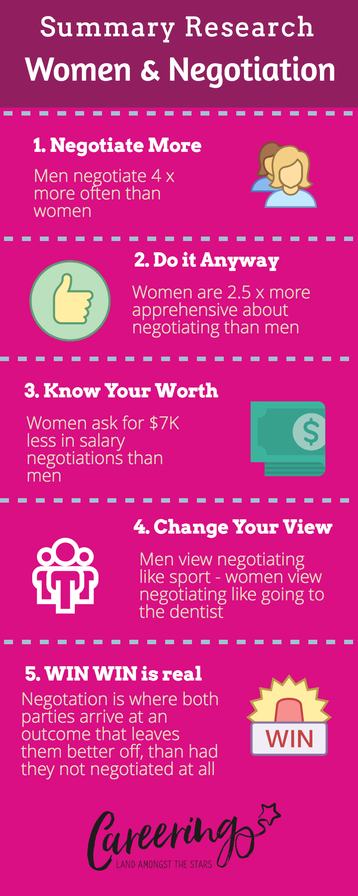Free Ebook How To Negotiate a Pay RiseIf you want a bit more context and a how-to guide, here's an ebook for you to access.
|
Negotiation
An essential skill to have, one we actually use often, but when it comes to the workplace or negotiating money, it seems that us women find it really tough. Here we will share what the research shows, what the impact is, and what you can do to really build and flex your negotiating muscle!
There's some hard data that needs your attention
|
A study by Emily Amanatullah, the Assistant Professor of Management at the University of Texas completed a research study that ask men and women to negotiate for themselves and on behalf of another. Her findings showed that when the women negotiated for themselves, they asked for an average of $7,000 less than the men, yet when they negotiated on behalf of a friend, they asked for just as much money as the men.
Amanatalluh says this is because when women negotiate for themselves, it's not just about money it's about their image and reputation too. “Women worry that pushing for more money will damage their image”. It's compounded when you look at the research by Babcock and Laschever which shows women hate negotiating! The research in their book Women Don't Ask: Negotiation and the Gender Divide, shows that 2.5 times more women than men said they feel "a great deal of apprehension" about negotiating. Men initiate negotiations about four times as often as women and when asked to pick metaphors for the process of negotiating, men picked "winning a ballgame" (they’re American, it would be the same as winning a rugby match) and a "wrestling match," (what is the Kiwi or Aussie equivalent of wrestling? Cricket? Surfing? Bowls?) while women picked "going to the dentist." So that’s not good. Pretty sure dentist visits are at the bottom of the list of ‘ways to spend an hour of my life’. How do we get negotiating up from the depths of dentistry and up to the tolerable ‘fitness test at the gym’, or better yet, right up there with other areas you feel a sense of achievement like smashing a PB at the gym or your chosen sport, completing that assignment or work project on time, or hearing your little ones read a book on their own for the first time? “Don’t bargain yourself down before you get to the table.”
- Carol Frohlinger "I realized . . . that I could have really negotiated for much more.... but I didn't. Because I accepted, 'Oh, I want to tie in with the range. I should feel lucky I have this job." - Emma, social science researcher (via Women Don't Ask) |
Good News
Like learning a new subject at uni, a new skill for work, or a new technique for your sport - its about skill, having a game plan and practising.
Negotiating is just like achieving that project deadline – you set yourself up for success from the start: I know what I want to achieve, I have a plan to get there, I’ve researched and I’m prepared, I’m practicing and I will push through till I get the outcome I want.
Selena Rezvani says her own research interviewing women executives shows that top women learned these skills with experience.
She says “Getting clear on why we're asking, and knowing that we deserve a seat at the table and that our case is worth pursuing can make the difference. Women who negotiate ignite a deep, healthy kind of self respect.”
Regardless of age, experience, preferences, love of yellow or red jelly babies, beliefs or style, each of us can learn to be good negotiators. The real power here is in asking for what we're worth, especially in the work place.
Negotiating is just like achieving that project deadline – you set yourself up for success from the start: I know what I want to achieve, I have a plan to get there, I’ve researched and I’m prepared, I’m practicing and I will push through till I get the outcome I want.
Selena Rezvani says her own research interviewing women executives shows that top women learned these skills with experience.
She says “Getting clear on why we're asking, and knowing that we deserve a seat at the table and that our case is worth pursuing can make the difference. Women who negotiate ignite a deep, healthy kind of self respect.”
Regardless of age, experience, preferences, love of yellow or red jelly babies, beliefs or style, each of us can learn to be good negotiators. The real power here is in asking for what we're worth, especially in the work place.
How to guide:
- Plan. Invest time preparing, role playing, saying out loud what you need to say or ask for
- Know what you're asking, what a 'win' looks like for you and why. Have facts and objective information on hand
- Understand the other party's view and what a 'win' looks like for them
- How you do it, how you say it, matters. Manage your tone well.
- Show up ready, be comfortable and confident. Breathe!
- Be professional at all times, do not take any comments personally or react emotionally
- Be okay with silence - one of the most important tactics to an effective negotiation is learning to become comfortable with occasional bouts of awkward silence
It also helps to be prepared on all of the following
- Know the market conditions and market rates or other relevant external benchmark that supports your request. Know your value.
- Allow time for them to review your case and come back to you
REMEMBER.
It will be difficult and uncomfortable at first, just like any steps toward building competency is.
This is a skill that takes time to build competency in – practice makes perfect.
We Jibber Jabber About This and What Not To Do
Podcast Season 1, Episode 2 is all about it and we share our mistakes like saying yes to whatever salary we were offered, and buying a brown suede jacket. Thankfully we've gotten smarter with age!
|
© COPYRIGHT CAREERING 2018. ALL RIGHTS RESERVED.
|


